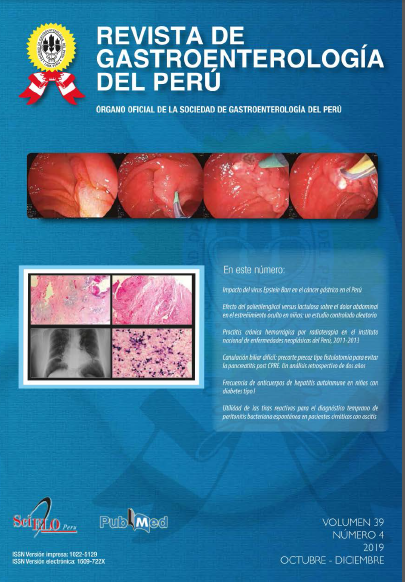Updated analysis of irritable bowel syndrome: a review of the literature
DOI:
https://doi.org/10.47892/rgp.2019.394.999Keywords:
Irritable bowel syndrome, Pathophysiology, Gastrointestinal diseases, Treatment, ReviewAbstract
Irritable bowel syndrome (IBS) is a chronic pathology with disorders of the bowel-brain interaction, characterized by abdominal pain localized anywhere in the abdomen as well as bowel habit alteration (constipation, diarrhea or mixed), in the absence of any disease that can cause these symptoms. With the updated concepts according to the latest meeting of experts in Rome 2016, our goal is to raise awareness about irritable bowel syndrome, by reviewing the literature regarding definition, classification, pathophysiology, clinical aspects, treatment, prognosis and the future. IBS is a chronic pathology, characterized by abdominal pain, at least 1 day per week in the last 3 months, associated with the alteration of the intestinal bowel habits.
With a classification based on the alteration of intestinal bowel movements and in addition to constipation induced by opioids or narcotics, the etiology and pathophysiology are not well explained or well-known so far. The clinical aspects are based on the Rome IV criteria. A good doctor-patient relationship is key to reassuring the patient’s doubts about his illness, which increases the chances of adherence to individualized treatment from patient to patient depending on the sing and symptoms that may manifest in those that include: dietary advice, psychological support, in some cases pharmacological prescription, suspension of medications or change medications, minimize the dose of drugs or suspend, according to the needs of the patient as is the case of opioids. The prognosis is still uncertain, and a promising future to illustrate new definitions, classifications, pathophysiologies, clinical aspects and treatments according to the type of clinical anifestation of each patient.
Downloads
Metrics
Downloads
Published
How to Cite
Issue
Section
License
Revista de Gastroenterología del Perú by Sociedad Peruana de Gastroenterología del Perú is licensed under a Licencia Creative Commons Atribución 4.0 Internacional..
Aquellos autores/as que tengan publicaciones con esta revista, aceptan los términos siguientes:
- Los autores/as conservarán sus derechos de autor y garantizarán a la revista el derecho de primera publicación de su obra, el cuál estará simultáneamente sujeto a la Licencia de reconocimiento de Creative Commons que permite a terceros compartir la obra siempre que se indique su autor y su primera publicación esta revista.
- Los autores/as podrán adoptar otros acuerdos de licencia no exclusiva de distribución de la versión de la obra publicada (p. ej.: depositarla en un archivo telemático institucional o publicarla en un volumen monográfico) siempre que se indique la publicación inicial en esta revista.
- Se permite y recomienda a los autores/as difundir su obra a través de Internet (p. ej.: en archivos telemáticos institucionales o en su página web) antes y durante el proceso de envío, lo cual puede producir intercambios interesantes y aumentar las citas de la obra publicada. (Véase El efecto del acceso abierto).

















 2022
2022 